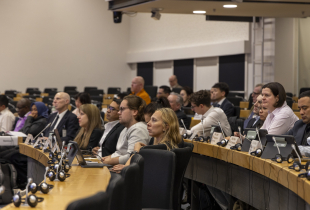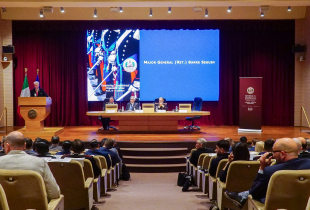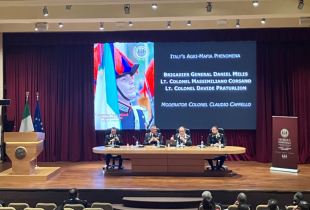
Marshall Center Educates Security Professionals to Counter International Illicit Threat Networks
By Christine June
Public Affairs Office
George C. Marshall European Center for Security Studies
GARMISCH-PARTENKIRCHEN, Germany (March 8, 2019) – International illicit threat networks operate with the intent to cause great harm to people, resulting in mass causalities, said the Deputy Assistant Secretary of Defense for Counternarcotics and Global Threats Thomas Alexander.
He spoke to 71 participants from 42 nations as the graduation speaker for the Program on Countering Transnational Organized Crime at the George C. Marshall European Center for Security Studies March 7. The Marshall Center is a German-American International security and defense studies institute based here.
“In my view, this places transnational criminal organizations and drug traffickers among the top national security threats to the United States,” he said. “This is why the first pillar of the National Security Strategy includes instruction for the United States to ‘Pursue Threats to their Source’ and ‘Dismantle Transnational Criminal Organizations.’”
When introducing DASD Alexander, the Marshall Center Director retired U.S. Army Lt. Gen. Keith W. Dayton said, “DASD Alexander is the reason you are all here. He is a huge supporter of the CTOC program, and he takes an active interest in what we are doing and more importantly, how you are doing.”
This is the second time that DASD Alexander spoke at a CTOC graduation. He was the graduation speaker for the last iteration of this program, which was held in August 2018.
“The Marshall Center has taken a lead role in educating security professionals in how to use a strategy development process to organize national and international resources to counter transnational organized crime,” said the CTOC Program Director Professor Joe Vann.
Held twice a year, the four-week CTOC residential course develops these skills through a combination of executive-level lectures, seminar discussions and a three-week exercise where all participants work in teams to write a CTOC strategy for a single country.
For this course, the country was Trinidad and Tobago, an island nation in the Western Hemisphere’s Caribbean Sea.
“Trinidad and Tobago is grappling with regionally-networked transnational organized criminal groups and the corrosive effects of corruption, money laundering, and many forms of trafficking,” said Vann on why it was chosen as the country for this exercise.
He also added that there were three participants from Trinidad and Tobago who were in this course and who helped their classmates on their decisions for their CTOC strategy as part of this exercise.
“We developed this exercise to give our participants an opportunity to step out of their roles as a law enforcement, military, or security professionals and to work collaboratively with a diverse group, whether they be scholars or practitioners,” said Professor Vann. “Probably,unlike in their day-to-day jobs, at the Marshall Center, they have time to think, read, consider and reflect on what they’re learning in this course.”
Before graduation, Alexander and the Assistant Director of the U.S. Federal Bureau of Investigation Bob Johnson were panel members as the participants, organized by their seminar groups, presented three deliverables for the Trinidad and Tobago CTOC strategy exercise.
After saying how impressed he was with the presentations, DASD Alexander said, “I particularly liked how you all focused on one country because that revealed the level of depth that needs to go into strategy development.”
He explained, “You must know everything about a country – the politics, geography and economics, to name a few factors – to write an effective CTOC strategy. I know that’s incredibly difficult, so I really appreciated the opportunity to sit in, hear your justifications for your decisions and ask you tough questions.”
Professor Vann said the CTOC course team teaches participants that transnational organized crime is a national security threat, expands their intellectual and functional knowledge of countering transnational organized crime, and builds their competencies and skills of participants, and the importance of the Marshall Center alumni network.
Diana Tsutskiridze, senior analyst for the Department of Information and Analysis at the Republic of Georgia’s State Security Service, said that the CTOC course shaped the way she thought about the challenges of countering transnational organized crime.
“I learned so many specific aspects of countering transnational organized crime like how to deal with corruption, money laundering, human trafficking and so many other topics that will be very useful to me in my daily work,” she said.
It was the networking opportunities in the CTOC course that was beneficial for Maj. Butusyo Joshua Mwakipesile, staff officer for the Republic of Tanzania People's Defence Force Headquarters.
“Countering transnational organized crime is not a one-man job because you need a network to defeat a network,” he said. “This is a chance to know people from more than 40 countries from military and civilian agencies and to hear different perspectives and experiences. After here, we will be still communicating and helping each other to defeat criminals.”


